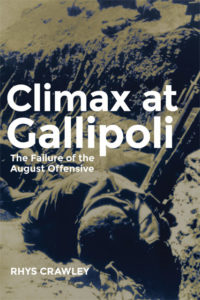The story of Australia’s part in the Gallipoli Campaign has become a central part of our national story and identity. On the eve of the campaign’s centenary it is a story that runs the risk of becoming more mythical in nature. Thank goodness, then, for Climax at Gallipoli which might put some objective balance back into the Anzac Centenary proceedings.
Climax at Gallipoli examines the performance of the Allies’ Mediterranean Expeditionary Force (MEF) in the August Offensive of the Gallipoli Campaign. Crawley’s examination of the Campaign is rigorous, dispassionate and timely. His key message is that the August Offensive was flawed from the outset and destined to fail.
Dr Rhys Crawley is a historian with the Strategic and Defence Studies Centre at the Australian National University. He has received several research scholarships and given talks on aspects of his research on the Gallipoli campaign at the University of Birmingham, the Imperial War Museum, the Australian War Memorial and the Istanbul Medeniyet University.
Crawley reminds us that in 1915, the second year of the war, the Allies were still adapting to a new form of warfare, with static defence replacing the manoeuvre and offensive strategies of earlier British doctrine. In the attempt both the MEF at Gallipoli and the British Expeditionary Force on the Western Front aimed for too much and the result was all too typical of the Great War – an aggregation of sacrifices as futile as they were heroic. To explain why, he examines in detail the operational level of war in the Campaign, critically scrutinizing planning, command, mobility, fire support, inter-service cooperation, and logistics. Crawley links these elements into a military ‘system’ and his work draws on unprecedented research in the UK and Australia.
Crawly is critical of the nationalistic rhetoric associated with the Gallipoli Campaign in general and the August Offensive in particular. “Gallipoli has gone down in history as something that was on the brink of succeeding,” says Crawley. “Victory was assured, the story goes, ‘if only’ the Allies had pushed a little harder, or had been the recipients of some simple good luck. “But when we take a step back, and view it as a case study in the how and why of 1915 warfare, we see a very different picture. It was not unlike what happened on the Western Front. “This was a new kind of war, and all armies were struggling to figure out how to adapt and defeat their enemy. It was years before the technology and tactics advanced to a stage where victory was possible.”
The Gallipoli Campaign has also been portrayed as one in which the British foolishly sent Anzac soldiers to their death, resulting in the loss of about 8,700 Australians, and 2,700 New Zealanders. This is a popular misconception that Crawley also disputes. “Contrary to what many believe to be the case, the British officers in charge of the campaign were not bumbling fools who joyfully sent men to their death in ill-conceived plans,” he says. “Rather, they were experienced men who had an intimate knowledge of their profession. “The popular narrative forgets that the British lost many more troops at Gallipoli with around 34,000 killed throughout the campaign.”
Crawley also reminds us that Gallipoli is not just a story about the Anzacs. “The Anzacs were a relatively small component of the Allied army of Indian, French, and British troops that landed on the Gallipoli Peninsula. Their role deserves to be part of our national narrative, as does their sacrifice,” he said. “By talking of the Anzacs at the expense of all others, we have afforded ordinary Australian volunteers, of all ages and walks of life, superman status. We have blown their actions and achievements out of all proportion, and have developed a national history of Gallipoli that is devoid of historical context.”
Climax at Gallipoli is highly recommended for all those interested in the Gallipoli Campaign and in the operations of the First World War as a whole. The price may put off casual readers, but at the same time reflects the high academic standard of his research and prose. Crawley should be commended for producing an objective account of the August Offensive based on primary source material, but sadly I fear it will become more a reference book for further research than a popular bestseller.

University of Oklahoma Press, Norman, USA, 2014; 364 pp.; ISBN 9780806144269; RRP $71.00 (hardcover)
Contact Marcus Fielding about this article.






